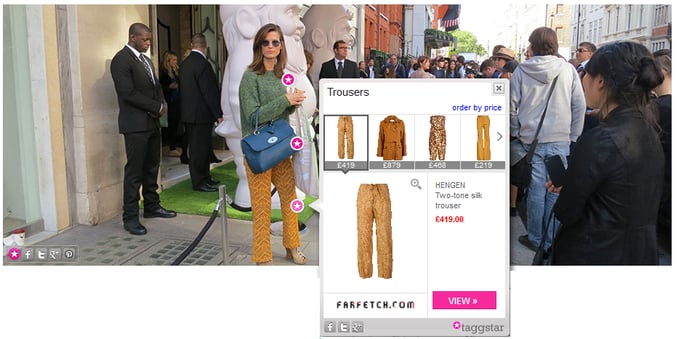Turn Your Pics Into Profits

Images are all the rage on the Web these days. This trend was probably inevitable, as it is an easy way for publishers, bloggers and marketers to satiate the desire of the average Internet user with quick bursts of content that can be easily digested and then set aside, while still spreading their message.
The problem with images is that once they're out there, the average Web professional doesn't know how to maximize their potential. However, the ability to make images more engaging and interactive, and eventually maybe even monetize them, is one that is the focus of many industrious developers, and the result is a number of solutions aimed at helping publishers and marketers make the most of their image-based content.
The basic premise of these various solutions is the same; publishers can add tags or "hotspots" to one of their images, which means they select a certain part (or parts) of the picture, and then when users scroll over the picture, these areas are highlighted. When the user clicks on these tags in the image, they're provided with additional content related to the picture. This can include everything from other relevant images to links to text to audio or visual content and beyond.
For publishers and marketers, these solutions present great opportunities to increase engagement (and thus interest) in their images, inspiring users to stop and interact with the picture, rather than just look at it and move on. Plus, these images can easily be shared on social networks like Twitter and Facebook to extend their reach - some of the products even come with social sharing tags. But they also offer more than just general engagement; customers can also utilize these as an ecommerce and advertising tool that can directly translate into cold, hard digital cash.
By making images "shoppable," users are able to click on the tags and be sent directly to a site where they can buy the product shown in the picture. Or, customers can link to products with their own affiliate links. Either way, when users click the link to the product, it will send them directly to the product page on the retailer's ecommerce site, and that allows publishers to get paid in the same manner they would for posting affiliate links in other types of content.

If you're interested in making your image content more engaging - and profitable - check out one of these solutions:
Luminate allows publishers to use images to engage their audience, add incremental revenue, improve session times and increase traffic, while advertisers can drive relevance, provide a focused brand message and engage consumers. Users can add "positional sharing" apps that let users choose a "specific point" on an image, comment on it and then share it on social networks like Facebook and Twitter. It also has an app that lets consumers browse and purchase products similar to those showcased in the image, and an Amazon Music app that lets them preview the music of the artist in a picture. It also comes with apps for YouTube Trailers, Netflix Videos, Wikipedia and much more.
Taggstar increases engagement with photos by an average of 40 percent and lets users earn money with ecommerce integration. Plus, it features robust analytics that provide real-time insights about how many and which people are looking at the pictures, and the images will remain trackable and monetized even when they're embedded from the customer's site to another one. And best of all, it's totally free.
Thinglink works on a variety of popular website and blogging platforms, including WordPress, Blogger, Tumblr, Drupal, Joomla and others. Users can add media tags from a number of platforms, such as huge names like YouTube, Twitter, Facebook, LinkedIn, Instagram, Spotify, SoundCloud, Wikipedia, iTunes and Vimeo. There's also integration with MailChimp for email campaigns, Etsy for displaying craft products, Eventbrite for promoting events, Best Buy and eBay for linking to products and more. And with Thinglink, users are able to import images from Flickr or Facebook, upload them from their hard drive or even copy the URLs of images from the Web.
Stipple lets publishers connect images via URLs, their websites or blogs, social networks like Facebook and Instagram or their online stores, and they can also upload them directly from their hard drives. Then, they tag those images with videos, other images, product links, locations, social media profiles, audio, notes or links. Stipple tracks the image to show the user where it "travels" to and how many people interact with it, providing them with the most accurate view of the picture's reach and engagement numbers, including what content inside the image fosters the most interaction.
They say that a picture is worth a thousand words, but thanks to the Internet (and these tools), it could end up being worth a thousand bucks, too. So, if you're interested in monetizing your images, now may be the time to look at one of these great solutions.

Subscribe to Our Newsletter!
Latest in Affiliate Marketing








